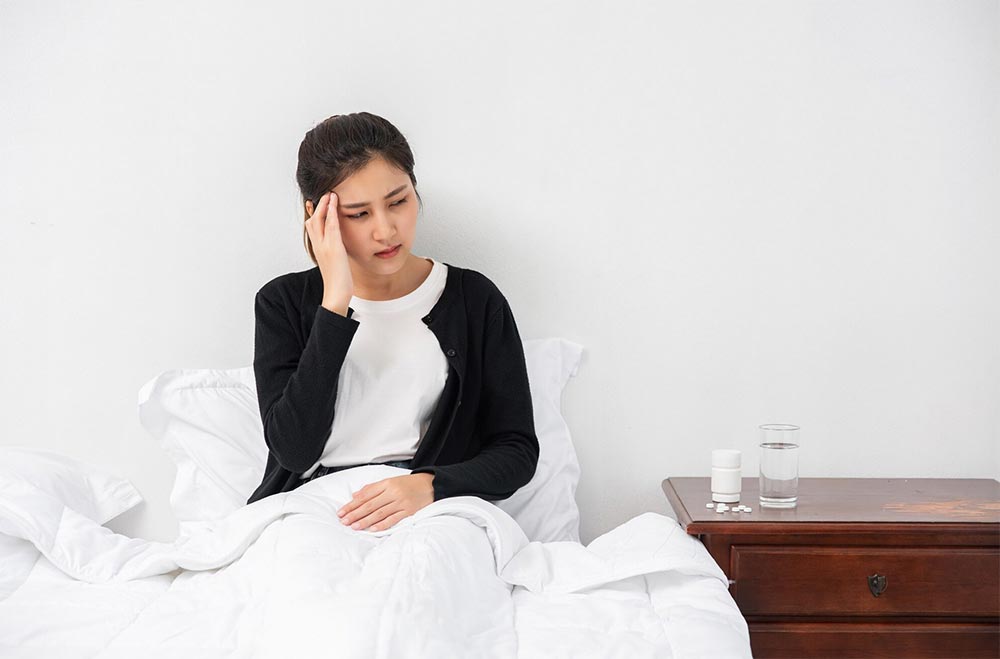Table of Contents
Millions of Americans experience migraines, and if you are one of them, you know it is not just an ordinary headache. The excruciating pain, pulsing, and intense throbbing associated with migraine are debilitating. According to Migraine Research Foundation, over 90% of people experiencing migraines cannot function or work normally during an episode.
This neurologic disorder, migraine, is characterized by throbbing headache attacks, ranging from moderate to severe, and is associated with nausea, vomiting, photophobia, and phonophobia. In the USA, 22.3% of female adults and 10.8% of male adults are affected by migraine.
Here are the common triggers affecting a large number of people suffering from migraine:
Stress
An increase or decrease in psychological or physical stress triggers migraine. According to one study, most people living with migraine report that their attacks are associated with stress.
An American Migraine Foundation report found that stress, perhaps the biggest trigger of all, is linked to 70% of people with this condition. Another research revealed that between 50% and 80% of individuals with migraines report stress triggers their attacks.
Some people experience a new attack during a stressful event, while others experience migraines after a stressful event.
Sleep Disturbance
According to National Center for Biotechnology Information, sleep disturbance is among the common migraine triggers. Insufficient sleep is often cited as a common trigger for acute attacks. Meanwhile, excessive sleep can also trigger attacks.
The correlation between sleep and migraine is undeniable. Remember that sleep helps repair and renew your different body parts, including your brain. So, once your sleep schedule or pattern becomes irregular, you will likely experience attacks. Almost half of these attacks happen between 4 AM and 9 AM, which puts you at greater risk of developing a sleep disorder.
Medication Overuse
If you experience migraine headaches while taking medication prescribed by your physician over 10 days a month, it can still trigger attacks. This phenomenon is called Medication Overuse Headache (MOH). In short, medication overuse is also one of the common migraine triggers.
Do you overuse painkillers or common analgesics? Then, you are more likely to experience chronic migraine from occasional migraine. Overuse of butalbital, opioids, and other pain relievers like nonsteroidal anti-inflammatory drugs (NSAIDs) causes you to experience more frequent headaches, leading to greater pain.
Weather Changes
Barometric pressure changes, excessive heat, and storms are weather-related migraine triggers leading to migraine attacks. Heat and high humidity can quickly lead to dehydration, which can also trigger migraines.
In one study, adolescents with migraines in Brazil report that weather patterns often trigger their headaches, including hold, cold, sunny, clear, and changing weather.
In another study featuring mostly women from Missouri and Ohio, thunderstorms with lightning were associated with the onset of headaches. Researchers notably concluded that lightning is a precipitating factor, but they are still uncertain how it triggers migraine.
Alcohol
Another common migraine trigger is alcohol. Many people with migraine experience heightened symptoms after consuming alcohol. According to a 2008 Brazilian study, one-third of people linked alcohol to their migraine attacks.
Red wines are more likely to cause migraine attacks than other alcoholic beverages, particularly among women. Based on that Brazilian study, red wine triggered the condition in 19.5% of men and women, while white wine resulted only in 10.5 percent of people being triggered.
Looking at those figures shows that women were affected disproportionately. This alcoholic beverage triggered migraine in just 8% of men. However, 22% of women were affected.
Food
Lack of food or particular foods is often reported to trigger migraine attacks. A study reported that 12% to 60% of people with migraines say that specific foods trigger their headaches.
According to a 2008 study, most people in Brazil with migraines consider their diet among the most frequently reported triggers. Caffeine, chocolate, and alcohol were the most common foods related to migraine attacks.
Other foods frequently trigger migraine headaches include salami, cheese, pickled, cured, and fermented foods containing large amounts of tyramine.
Bright Lights
Natural light is one of the enemies of people with migraine, making it difficult for them to spend time outside. This condition is known as photophobia. Aside from natural light, other people experience attacks due to flickering bulbs.
However, a neurologist stated that sunlight might not be the primary migraine trigger. It only triggered his migraine after drinking wine the previous night. The neurologist also noted that sunlight triggers his migraine if he is dehydrated, stressed, sleep-deprived, or skipped a meal, resulting in low blood sugar. He concluded that bright light might only be a secondary trigger.
Conclusion
Migraine attack triggers were supported by different clinical trials, diary studies, and patient surveys. The common factors mentioned are stress, sleep disturbance, medication overuse, weather changes, alcohol, food, and bright lights.
Knowing what triggers your migraine will help determine the best possible way to manage your attacks or prevent them. However, not all people have the same triggers.
Are you looking for treatment options for your migraine? Feel free to check out our clinical trials at Power.

